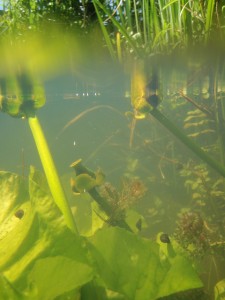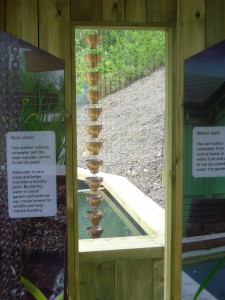New 50K interactive Pondzone makes a (recycled rainwater!) splash
The secret underwater world of pond creatures is being brought vividly to life, thanks to a new interactive pond dipping exhibit at WWT Washington Wetland Centre.
 The 50K Pondzone - which was generously funded by County Durham Environmental Trust (CDENT), the Shears Foundation, Community Foundation Tyne & Wear and Northumberland, the Catherine Cookson Charitable Trust, The Percy Hedley 1990 Charitable Trust, the Joicey Trust and The Sir James Knott Trust - opened today, with youngsters from St Cuthbert’s Roman Catholic Voluntary Aided (RCVA) Primary School in Seaham carrying out the very first pond dip.
The 50K Pondzone - which was generously funded by County Durham Environmental Trust (CDENT), the Shears Foundation, Community Foundation Tyne & Wear and Northumberland, the Catherine Cookson Charitable Trust, The Percy Hedley 1990 Charitable Trust, the Joicey Trust and The Sir James Knott Trust - opened today, with youngsters from St Cuthbert’s Roman Catholic Voluntary Aided (RCVA) Primary School in Seaham carrying out the very first pond dip.
A high-tech underwater camera allows visitors to discover what lurks beneath a pond’s surface, while a giant viewing tube gives 360 degree, eye-level views of the inhabitants in action; diving, eating, hunting and mating.
WWT Washington’s learning manager Joanne Newbury said: “This is real ‘nature in action’ stuff and is the closest our visitors have ever been able to get to pond creatures such as the great diving beetle (or ‘water tiger’), great diving beetle larvae (or ‘the dragon’) and pond skaters.
“When we run our pond dipping sessions, almost 80% of visitors request one, so these fantastic new facilities are going to be of huge benefit, both in terms of education and boosting the visitor experience.”
In 2011, WWT commissioned a national opinion survey during its ‘Work Your Butt’ campaign, which encouraged people to reuse rainwater for everyday tasks such as washing cars, watering plants and topping up ponds.
The results highlighted a growing awareness and concern about water usage, along with a willingness to do more to reduce flooding and help wildlife.
In the North East, only 16% of those surveyed actually owned a water butt or rain collector; but 53% said they would definitely consider having one, while 61% would think about cultivating plants that naturally soaked up water and 41% would consider installing a ‘green roof’ on their property, to handle excess rainfall.
 Joanne added: “These results showed that the will to change our habits in relation to water usage is there and the work that we do here at WWT Washington Wetland Centre aims to help people make that change.
Joanne added: “These results showed that the will to change our habits in relation to water usage is there and the work that we do here at WWT Washington Wetland Centre aims to help people make that change.
“The new Pondzone illustrates how easily water recycling can be, with features including a rain chain - which collects rainwater to be reused in the dipping ponds - and a small reedbed, which filters out dirt and nutrients from water passing through the hand washing facilities.”
WWT’s survey also found that 42 % of those asked were ‘convinced’ that using water butts and storing water through ponds can help prevent serious flooding; while 25% were also ‘more concerned’ now than they were five years ago about the shortage of water in gardens and public spaces for wildlife.
“Wetlands are being lost or damaged more rapidly than any other ecosystem,” added Joanne. “These results highlight the increasing importance of WWT’s vital conservation work, which is helping to save wetland habitats worldwide.”
For further details about the Wildfowl & Wetlands Trust’s work to save wetland habitats, please visit http://www.wwt.org.uk/wetlands-and-wildlife/



